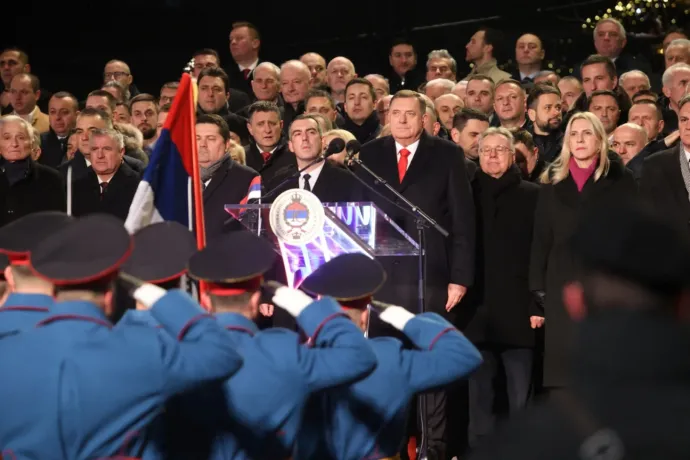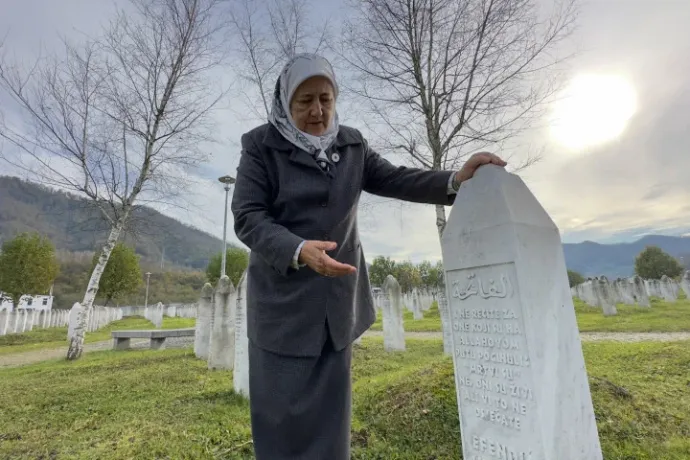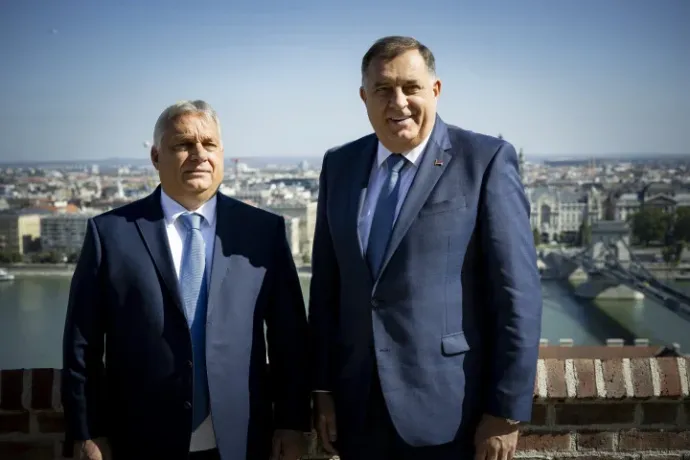Why it might not go down well if Orbán were to personally accept Dodik's award

As part of the festivities on the occasion of the National Day of Republika Srpska (RS) on 9 January in Banja Luka, the head of the entity, Milorad Dodik, decorated Hungarian Prime Minister Viktor Orbán with the highest honour of the RS. The venue itself was symbolic, because although the capital of Republika Srpska (just like the capital of the Federation of Bosnia and Herzegovina) is officially also Sarajevo, the Bosnian Serbs consider Banja Luka to be their capital. The day the event was held is also symbolic because while Bosnia and Herzegovina celebrates its independence on 1 March, 9 January is the anniversary of the 1992 proclamation of the Bosnian Serb breakaway state.
While Viktor Orbán did not attend the ceremony in person, Balkan Insight reports that Dodik told the celebrating crowd that the Hungarian Prime Minister had accepted the award, and would receive it in person in February.
While Banja Luka spent €230,000 on the festivities last year, this year's budget for the officially banned holiday, which the Constitutional Court of Bosnia and Herzegovina has condemned in two separate rulings, was €332,000. As part of the celebration, 3,400 participants paraded through Banja Luka's main street, including armed police, war veterans, members of sports clubs, with helicopters flying overhead and, for the first time this year, drones as well. What's more,
even US military jets took to the skies, albeit for the very opposite reason – as a show of force and a warning rather than a celebration.
In any case, the usual fireworks display came at the end of the celebrations, this time coordinated with Serbia and launched simultaneously in Banja Luka and Belgrade. In a typical show of enthusiastic Serbian support, on 9 January, Belgrade's biggest illuminated banner, where the state's Christmas or New Year greetings and sometimes information about the success of the incredibly popular Novak Djoković is displayed, was dedicated to the birthday of Republika Srpska.
The press of other Balkan countries also reported about the announcement that Orbán had been honoured, often noting that Russian President Vladimir Putin had received the same award last year. In Bosnia and Herzegovina, however, it is not this particular incident that is causing divisions, but the celebration itself. Celebrating 9 January usually infuriates the Bosniaks and Croats, who consider the day to be linked to the outbreak of the bloody Bosnian war of the nineties. On the other hand, the EU and the United States dislike it because by insisting on celebrating this day, the Bosnian Serbs are defying the rulings of the Constitutional Court and are not following the law.
9 January has grown into an almost sacred holiday in the world of Serbian Orthodoxy. While more and more people have switched to celebrating Christmas on 24-25 December and welcoming the New Year on 1 January, the Orthodox tradition celebrates church holidays according to the Julian calendar with a two-week delay compared to the Gregorian calendar. Christmas Eve thus falls on 6 January and New Year's Eve on 13 January. The holiday of the Bosnian Serbs commemorating
the 9 January 1992 thus happens to be right between these two.
How Republika Srpska came about
During the break-up of Yugoslavia and the secession of Slovenia and Croatia, it was clear that Bosnia and Herzegovina could not remain part of the federation for long. In December 1991, the Bosniak majority, supported by the Croat population, initiated the EU's recognition of the independence of Bosnia and Herzegovina and Macedonia, along with that of Croatia and Slovenia. Before this could happen, the Bosnian Serbs, who would have preferred to remain in alliance with Serbia, proclaimed their own independent state, the predecessor of the Republika Srpska, the Serb People's Republic in Bosnia and Herzegovina, on 9 January 1992.
For them, this became 'Independence Day', instead of 1 March, the anniversary of the 1992 independence referendum celebrated in Bosnia and Herzegovina. In the referendum, 63.7 percent of eligible voters turned out, with 99.7 voting in favour of Bosnia and Herzegovina's independence, and only 6037 against. This was hardly surprising, given that the Bosnian Serb community boycotted the referendum and the local Serb authorities obstructed the vote.
According to the Bosnian Constitutional Court, 9 January cannot be a public holiday because it is discriminatory. At most, it can be a holiday for Bosnian Serbs, but it is more likely to reopen wounds in Bosniaks and Croats, since 9 January is what led to the outbreak of the Bosnian war in April 1992. During the more than three years of the war, under the leadership of Serb political and military leaders Radovan Karadzic and Ratko Mladić, Serb fighters committed a series of genocidal acts. Mladić and Karadžić were later sentenced to life imprisonment by the International War Crimes Tribunal for their crimes and are currently serving their sentences.

It is precisely for this reason, that this year on 9 January, there was a commemorative rally held in Srebrenica-Potočari, where the memorial to the victims of the genocide committed by the Serbs is located. According to the women who participated in this year's march,
'it is because of 9 January that we have no husbands, no fathers, no children'.
Let's also empathize with the Serbs for a moment. If we follow the logic of the Constitutional Court, then local Serbs may feel discriminated against on the occasion of the Bosnian national holiday, the anniversary of the independence referendum of 1 March. They did not take part in the referendum and can argue that it was not their decision, and that it was the striving for independence without taking their interests into account that led to the war.
In any case, the leadership of Bosnia and Herzegovina, and two of the three constituent nations, the Bosniaks and the Croats, see a direct link between 9 January and the war that claimed some 200 000 lives and forced 2.6 million people to flee their homes. The Serbs, on the other hand, say that 9 January is the very foundation of their existence, that they will continue to celebrate it, and
the National Assembly of the Bosnian Serbs has even passed a law stipulating that the decisions of the Constitutional Court of Bosnia and Herzegovina cannot be applied in the RS.
Even though the country has such separate ethnic parliaments, the UN High Representative Christian Schmidt has the authority to veto decisions of the national parliaments, and he has indeed annulled the law. He went further in fact, and had national legislation passed according to which, refusing to accept the decisions of the constitutional court is punishable by five years in prison. The US embassy in Sarajevo also weighed in, issuing a statement saying that the celebration of Republika Srpska Day was a "criminal offence". On the other hand, and even more frighteningly, during the commemoration, the US Air Force and Bosnian state forces held a joint air exercise. The timing and the show of force itself was hardly a coincidence.
Naturally, Dodik called the US exercise a provocation.
At this time, we shall not go into the details of how this very hard-to-run state was formed after the 1995 Dayton Peace Accords. Suffice it to say that there is still no reconciliation between the ethnic groups, and Milorad Dodik is regularly stirring up tensions. He regularly says that nobody can give orders to the Serbs. He also says that when Donald Trump is re-elected, he will announce Republika Srpska's actual secession, and also talks about joining his part of the country to Serbia.
Dodik also makes no secret of the fact that during international football matches, he cheers for the Serbs, not the Bosniaks. He does so even though it has happened before, that as part of the rotation of ethnic leaders, he headed up the presidency of Bosnia and Herzegovina. During this period, it was particularly poignant that a politician would cheer for the disintegration of the country he was leading, or even against its national team.
What do Serbs in Serbia think?
On the other hand, with Dodik making such statements, their big brother Serbia, led by Aleksandar Vučić, who is also very close to Viktor Orbán, finds itself in a very delicate situation. Although the Serbs in Serbia are very supportive of the Bosnian Serbs, Vučić was not present at the Banja Luka celebrations this year, because the independence of the RS, let alone its unification with Serbia, would create an unpleasant situation. The former, because Serbia's failure to recognise Kosovo's independence to date would then become untenable, and the latter could even set a precedent for Kosovo's unification with Albania.
Dodik's logic is different. He argues that if Kosovo was allowed to become independent on the basis of nationality, they should be allowed to do the same. Why is the world discriminating against the Serbs? In spite of this, it is not entirely clear whether he would indeed support accession to Serbia, where he would no longer have so much political clout as he does being the ruler of the Bosnian Serbs. Analysts often get the feeling that Dodik is most interested in making threats, in maintaining the tension in which his own people support him. As a result, Aleksandar Vučić is thus pursuing a double-edged policy and communication, with messages such as "we will not allow our Bosnian Serb brothers and sisters to be humiliated" and "we will abide by the Dayton Peace Accords" side by side.
There are currently other tensions between the Bosnian Serbs and Serbs in Serbia as well. Since the recent elections in Serbia, the opposition has been claiming fraud and has held several protests in Belgrade. According to one accusation, for example, tens of thousands of Bosnian Serbs voted illegally for Aleksandar Vučić. Examples of abuse have been shared across social media pages – these include instances when someone was registered as living on a certain floor of a block of flats, but the building at the address only has a ground floor. In another example, dozens of voters of Bosnian origin were registered in a tiny hut. A well-known Bosnian Serb politician, the Minister of the Interior, was also found to be a voter, but even these cases have not managed to sway the basically unanimous, total commitment to the Bosnian Serbs:
Meanwhile, Belgrade cinemas are showing the film Republika Srpska: Borba za Slobodu (Republika Srpska: The Struggle for Freedom) to huge audiences.
The film, which quickly became a cult movie, is the work of Serbian-Canadian filmmaker Boris Malagurski, who has been described in the local press as "the Serbian Michael Moore". The director has been making films advocating issues related to Serb ethnicity for years – and has, of course, other than Bosnia and Herzegovina, also dealt with Kosovo. His latest work, featuring fellow director Emir Kusturica, has been playing to sold-out theatres across Serbia. Meanwhile, each time it is shown at an international film festival, it provokes fierce international protest.
What does all this have to do with Hungary?
But how do Viktor Orbán and Hungary fit into the equation? There are several similarities. First and foremost, the European Union and the United States do not look kindly on the Bosnian Serbs talking about going their own way within what they say is an artificial homeland they were forced into, thus destabilizing it. Their president, Dodik, rejects Western orientation and is pursuing a very pro-Russian path. Orbán himself regularly speaks with Russian President Putin and is critical of the EU's policy of sanctions against Russia. In Bosnia, he is pursuing an explicitly pro-Serb foreign policy, and even funds the Bosnian Serbs, thus disrupting EU unity.

Telex has previously written about this in detail. At this time, suffice it to say that the Hungarian government has so far helped RS with a very favourable, ten-year loan of 110 million euros, and a financial package of 35 million euros. Why is Viktor Orbán doing all this rather unilaterally? We cannot know the exact reasons, but it could be:
- a gesture towards Russia and a slap in the face of the EU;
- or perhaps, as an enthusiastic supporter of EU enlargement in the Western Balkans, Viktor Orbán is looking to forge relationships with countries which might later become his allies in the EU;
- but the goal may also be economic expansion.
If it is the latter, there is not much to show for it yet.
There are other parallels between Orbán and Dodik too, one of them being that both of them have friends and relatives who have come to dominate a number of economic sectors in their respective countries. This is something that the great hope of Dodik-opposing Bosnian Serbs, the young, barely 30-year-old mayor of Banja Luka, Draško Stanivuković, used to rant about in his anti-corruption speeches. As BNN also reports, Dodik's son (Igor), daughter (Gorica) and son-in-law (Pavle Djorić) own an extensive network of fruit producing companies, food and pharmaceuticals retailers and media outlets, as well as a lucrative restaurant and a lot of real estate.
Both Orbán and Dodik are keen to develop their home village. Felcsút and Laktaši, which is not much bigger than Felcsút, have both prospered very nicely. Dodik is more modest in that, while Felcsút is now a top team of the Hungarian first division, FK Laktaši still plays in the second division.
Their rhetoric is similar as well, with both often talking about the opponents of their country, the foreign-influenced opposition, journalists and NGOs.
At any rate, the Bosnian Serbs did hold a celebration on 9 January, and the other nationalities of Bosnia and Herzegovina were not very pleased about it. In that region, the hero of one nation is the ruthless murderer of the others. This is why our sources familiar with the country warn that if Viktor Orbán becomes even more committed to the Bosnian Serbs and keeps up his friendship with Dodik, it is likely to bring about a strong reaction. For the most part, this has already happened, but if Orbán does indeed personally receive the award, he will be risking the doors in Sarajevo being shut even tighter.
For more quick, accurate and impartial news from and about Hungary, subscribe to the Telex English newsletter!